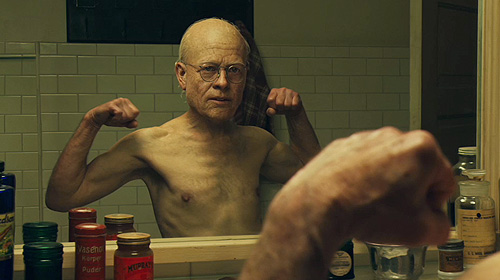Belton, you may remember, was the Indiana University professor who was found stabbed to death in his home on Christmas day. He was the gay Indiana University professor; his killer, ex-Marine Michael Griffin, has not only confessed but has explained his motive for stabbing Belton:
The former military man told police that Belton, who was openly gay, sexually assaulted him in front of his girlfriend, while they were both intoxicated on Christmas Day. And because the assistant professor of English refused to "show remorse," Griffin stabbed him to death, according to court documents.
Bloomington's LGBTQ community was hit fairly hard by the news of Belton's death. In part, this is because Belton was well liked; and in part, this is because the killing repeats the old message that nobody wants to be reminded of: It's (still) not safe to be gay in America.
A web site was built and called "Justice for Don Belton." Vigils were held. Press releases (here, here) were circulated mourning Belton's death and noting the loss to the IU community. And this year's Pride Film Festival, an annual LGBTQ event held in downtown Bloomington, has been dedicated to Belton's memory.
All of this for someone who has officially been identified as a perpetrator of sexual assault.
If this were a hetero situation, and the killer were a woman who claimed to have killed a man after two incidents of sexual assault, there would be no vigils. There would be no websites. There would be no film festival dedicated to the dead man's memory. And rightly so: After centuries of struggle, we have finally started to evolve into a society that does its best to side with the alleged victim in cases of sexual assault. We aren't a society that does its very best, of course, and you know, we sort of keep having to have the same conversation every time it comes up: Rape is not about sex. It's about power. And women who accuse a man of literal rape have been subjected to metaphorical rape by a court system that embraces a blame-the-victim mentality. And so on. But we're trying, and we're getting better at having these conversations.
And of course this isn't a hetero situation, and the gender, power, and sex issues don't map. We pretty much don't believe that Belton was a rapist or that Griffin was a victim; we believe--and, to be clear, I believe--that Belton was brutally murdered, and that the motive was homophobia. Homosexuality is a deep threat to heteronormative culture, to the status quo. It's dangerous and terrifying and the most insecure among us believe it must be blotted out. With violence, if needs be.
 Belton's death is a reminder that no matter how far we've come, we're still a society that cannot guarantee the safety of its marginalized members. Bloomington was recently named America's 4th gayest city by the Advocate, which confuses me but let's go with it for now. And this year's Pride Festival,
Belton's death is a reminder that no matter how far we've come, we're still a society that cannot guarantee the safety of its marginalized members. Bloomington was recently named America's 4th gayest city by the Advocate, which confuses me but let's go with it for now. And this year's Pride Festival, which is deploying at the Buskirk-Chumley theater this very weekend, has drawn hundreds, if not thousands, of beautiful, joyous, and celebratory LGBTQ and LGBTQ-friendly community members. But all it takes is misreading one person, or showing up at the wrong bar at the wrong time, or acting a little too gay, or even just holding your partner's hand in public; and the Great Lie starts to unravel. It's not safe to be gay in America. It's not even always acceptable to be gay in America.
This isn't to say the reaction of the LGBTQ community to Belton's death is completely ick-free. There is the issue of classism. Part of the reason we don't believe Griffin is that Belton was so cultured. He was well educated. He was a writer. He was a professor, for godsake. He couldn't have possibly raped someone. I mean, just look at his picture:
Here's Griffin, an ex-Marine, 23 years old:
Leaving aside issues of race--not because I think we should leave those issues aside, but because I'm not qualified to talk about race--we craft a narrative around Belton and Griffin, and it's a narrative that points to deep class assumptions that hover above issues of gender and sexual orientation. It's the same sort of narrative that frames, for example, the story of Tiger Woods and his multiple mistresses ("Cocktail waitresses! Pancake servers! Why's Tiger rooting around in the trash?!?"), our attitudes toward celebrities ("Britney Spears--you can take the girl out of Hicksville, but...."), and the political decisions that undergird our social structure.
It's easier and simpler to use Belton's murder as a touchstone for conversations about the state of gay rights in America. In fact, this story, like all stories worth telling, is far more complicated and multithreaded. Like all stories worth telling, the work of interpreting the details is far less clearcut than it seems upon first blush.













